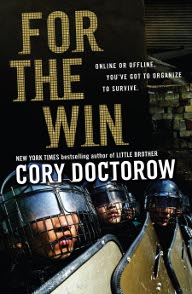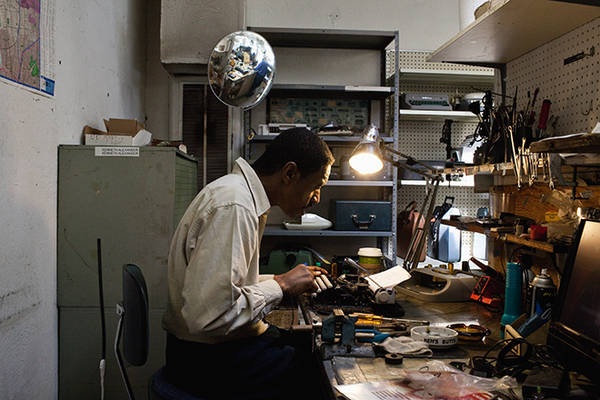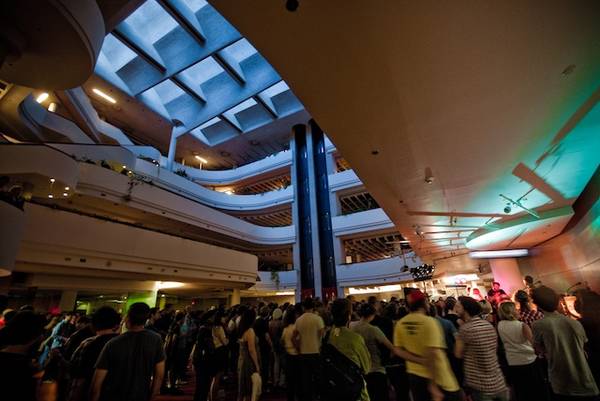The Latest from Boing Boing |  |
- Coming to Toronto this Friday
- Typewriter repairmen in photos
- CMU's Research Cafe: a living behavioral economics lab that serves tasty snacks
- Digital Economy Act sets UK gov't on the path to ever-more-punitive Internet laws
- RIP, Jeanne Robinson
- MDs ask patients to assign copyright in any web-posting that mentions their care, to simplify censorship
- Toronto's main reference library hosts punk gig
- Guatemala: First, volcanic eruption; then, devastating tropical storm
- McRefugees in Shanghai find refuge in fast food joints
- The "flotilla video": Israeli troops storm boat with aid supplies bound for Gaza Strip
- Woman sues Google after being hit by a car while using walking directions
- Julian Assange profiled in New Yorker
- China sets new rules banning confessions by torture
- Microsoft opens Windows 7 restaurant in Taiwan
- Audio clip of prayer time at Dubai airport
- Spongebob, age 50
- Beep-it optical theremin in Boing Boing Bazaar
| Posted: 01 Jun 2010 04:10 AM PDT  Just a reminder: I'll be in Toronto this Friday, June 4 for the Canadian launch of For the Win. We're launching it at the Merril Collection (239 College Ave, east of Spadina), starting 6:30PM. The good folks from Bakka-Phoenix Books will be on-hand with hardcopies to buy, as well. Just a reminder: I'll be in Toronto this Friday, June 4 for the Canadian launch of For the Win. We're launching it at the Merril Collection (239 College Ave, east of Spadina), starting 6:30PM. The good folks from Bakka-Phoenix Books will be on-hand with hardcopies to buy, as well. |
| Typewriter repairmen in photos Posted: 01 Jun 2010 04:06 AM PDT  Wired's Matthew Shechmeister visited three of the Bay Area's last typewriter repairmen and photographed them in their workshops, practising their arcane and dying art. Meet the Last Generation of Typewriter Repairmen
|
| CMU's Research Cafe: a living behavioral economics lab that serves tasty snacks Posted: 01 Jun 2010 04:03 AM PDT The Carnegie Mellon Research Café isn't just a cafe -- it's also part of the Social and Decision Sciences Department, and its wares aren't just tasty snacks; they're also props in a series of ongoing behavioral economics experiments in choice theory and other subjects. Behavioral Café (Thanks, Marilyn!)
|
| Digital Economy Act sets UK gov't on the path to ever-more-punitive Internet laws Posted: 01 Jun 2010 03:53 AM PDT My latest Guardian column, "Why the Digital Economy Act simply won't work," warns that now that the British state has assumed responsibility for maximizing the profits of entertainment companies, it will have to take ever-more-restrictive measures against its own people: And because once the state decides that it has a duty to police the internet to maximise the profits of a few entertainment companies (no matter what the public expense), it sets itself on a path of ever-more-restrictive measures. Once disconnection drives downloaders to make use of SSL-based proxies, watch for Big Content to inveigle their friends in parliament to enact laws prohibiting the use of virtual private networks - never mind that these are the best practice of anyone trying to safeguard a corporate or organisational network.Why the Digital Economy Act simply won't work
|
| Posted: 31 May 2010 05:56 PM PDT  Sincere condolences to Spider Robinson and family on the passing of his wonderful, talented wife: the dancer, writer and choreographer Jeanne Robinson, after a long struggle with cancer. The human race has lost one of its finest members. Spider and Jeanne's family -- including their grandchild -- were able to be at her deathbed when she went, and by Spider's account, it was a sweet and gentle moment for them all. Sincere condolences to Spider Robinson and family on the passing of his wonderful, talented wife: the dancer, writer and choreographer Jeanne Robinson, after a long struggle with cancer. The human race has lost one of its finest members. Spider and Jeanne's family -- including their grandchild -- were able to be at her deathbed when she went, and by Spider's account, it was a sweet and gentle moment for them all. (Image: Spider_and_Jeanne_Robinson.jpg, Wikimedia Commons/C. A. Bridges; Creative Commons ShareAlike) |
| Posted: 31 May 2010 05:50 PM PDT Jason sez, "Doctors are being urged to give their patients a legal form that transfers a patient's copyright over web postings if they mention the doctor or practice online. The doctor can then send a DMCA takedown notice and have the criticism removed from the web without filing a lawsuit. As a fiction writer this worries me greatly, especially since the organization pushing this copyright transfer says it can also be used for fictional posts." Medical Justice, who came up with this ridiculous scheme, also seriously misrepresents Wikipedia's position on anonymous editing. When Online Gripes Are Met With a Lawsuit Go to the doctor, lose the copyright to your writings (Thanks, Jason!) |
| Toronto's main reference library hosts punk gig Posted: 31 May 2010 02:51 PM PDT  David sez, "I thought you might be interested in this fantastic article about Toronto punk darlings, Fucked Up, playing a free show at the Toronto Reference Library last night. I love the quote in the article, 'Fucked Up admit to getting most of their album artwork from the Reference library and give props to its "solid microfiche collection".'" When I was 14 years old, I "de-enrolled" myself from the high-school I'd started out at, stopped going to classes, and took the subway to Metro Ref every day, burying myself in a dozen subjects (and yes, seriously raiding the microfiche). It really warms my heart to see these pics. Fucked Up Make Some Mosh at the Reference Library (Thanks, David J!) |
| Guatemala: First, volcanic eruption; then, devastating tropical storm Posted: 31 May 2010 04:56 PM PDT  Update, 2pm PT: HOW TO HELP, after the jump. Above, this photo just posted to the Guatemalan Government's Flickr feed shows a massive, spontaneous sinkhole ("hundimiento") that appeared today in Zone 2 of Guatemala City, after overwhelming saturation of rains from tropical storm Agatha. Not Photoshop, sadly: these happen from time to time during major storms in part because of unstable geology (and bad urban engineering—read more about it in the comments). There are rumors of similar sinkholes now forming nearby. See it on Google Maps. (News reports: Prensa Libre, and blogs) Two days later on May 29, tropical storm "Agatha" struck, destroying homes, causing floods, and creating tens of thousands of internally displaced. Infrastructure in this country—where the majority live in poverty—is very poor, and ill-equipped to handle such a double blow. As of last night, official numbers on storm: about 30,000 "refugees," close to 120,000 evacuated, 93 dead and rising. Guatemala's one international airport has been has been closed for days, and just as it prepares to reopen today, there's word of new volcanic activity. The poor always suffer the most when events like this happen, and the two events together caused surreal conditions: knee-deep black sand mud, and "instant concrete" that forms when rain meets ash, clogging up drains and fragile sewage systems. Said a friend on Twitter, "Water and sand everywhere... it's like the beach, only a lot less fun." Today I learned that in the rural K'iche Maya pueblo where I volunteer with a non-profit, a local committee of community leaders is organizing to walk to other villages in the region, and check on damage, injuries, casualties. In rural areas, phones still aren't working, and many communities are only accessible by foot. Guatemala isn't the only Central American nation affected: at least 10 are dead in El Salvador, and Honduras has declared a state of emergency. Inset above, an image from the Guatemalan government's Flickr feed, of a child evacuated from a village near the volcano. Here are documents related to the disaster (in Spanish). Reading and photos, and a guide to Twitter accounts and hashtags: Antigua Daily News, "Stop, Agatha, Stop!" And here's an item by Juliana Rincón Parra in Global Voices.
HOW YOU CAN HELP Renata Avila of Global Voices in Guatemala says,
|
| McRefugees in Shanghai find refuge in fast food joints Posted: 31 May 2010 10:48 AM PDT  Shanghaiist points us to an interesting article (in Chinese) about McRefugees, residents of Shanghai who spend their nights sleeping in McDonalds because they don't have enough money to pay rent. Shanghaiist points us to an interesting article (in Chinese) about McRefugees, residents of Shanghai who spend their nights sleeping in McDonalds because they don't have enough money to pay rent. ...[McDonald's] spokesperson Mr. Lu said the store "doesn't explicitly allow it, but doesn't explicitly disallow it." But for all the stores in the Tianyaoqiao Lu area, KFC has the most serious McRefugee problem. "Because there's sofas there, [McDonalds] only has hard stools. In the winter, people will even bring their blankets and bedrolls into the restaurant."A similar phenomenon exists in Japan's internet cafes and fast food joints, too. I once met an internet cafe refugee in Tokyo; he used to wait tables at a bar but was having trouble finding work and didn't want to go home to his parents', so he spent most of his evenings sleeping in internet cafe booths or riding around the Yamanote train line. |
| The "flotilla video": Israeli troops storm boat with aid supplies bound for Gaza Strip Posted: 31 May 2010 11:08 AM PDT Analysis and reactions around the web: The Wikinews article is interesting, in part for the clash of perceptions from those who condemn and those who support the actions of Israel's military. This Jerusalem Post article touches on the resulting PR and media offensive out of Israel, and the government's rationalization for what it maintains was a justified and defensive event (and pointed to ties with Turkey and alleged "Islamist" groups). More reading: "Why the Gaza boat deaths are a huge deal," Blake Hounshell in Foreign Policy. Condemnation from South African Anglican Archbishop Emeritus Desmond Tutu. "A Lesson in Information Operations," Center for a New American Security. Ha'aretz: "Israel Lost at Sea." Top Israeli official when Gaza blockade was imposed several years ago: "The idea is to put the Palestinians on a diet." |
| Woman sues Google after being hit by a car while using walking directions Posted: 31 May 2010 10:18 AM PDT  A woman named Lauren Rosenberg is suing Google for $100,000 after she walked onto a highway and got hit by a car while following Google Maps directions on her Blackberry. She disregarded, or didn't see, the warning that says: "Walking directions are in beta. Use caution - This route may be missing sidewalks or pedestrian paths." She also apparently didn't use common sense. A woman named Lauren Rosenberg is suing Google for $100,000 after she walked onto a highway and got hit by a car while following Google Maps directions on her Blackberry. She disregarded, or didn't see, the warning that says: "Walking directions are in beta. Use caution - This route may be missing sidewalks or pedestrian paths." She also apparently didn't use common sense. From Fortune: Defendant Google, through its "Google Maps" service provided Plaintiff Lauren Rosenberg with walking directions that led her out onto Deer valley Drive, a.k.a. State Route 224, a rural highway with no sidewalks, and a roadway that exhibits motor vehicles traveling at high speeds, that is not reasonably safe for pedestrians.If Google told you to jump off a cliff, would you? [Fortune] |
| Julian Assange profiled in New Yorker Posted: 31 May 2010 12:15 PM PDT  Julian Assange is the founder of WikiLeaks.org, a Web site that "collect[s] documents and imagery that governments and other institutions regard as confidential and publish[es] them." He is profiled by Raffi Khatchadourian in the June 7, 2010 issue of The New Yorker. Assange is an international trafficker, of sorts. He and his colleagues collect documents and imagery that governments and other institutions regard as confidential and publish them on a Web site called WikiLeaks.org. Since it went online, three and a half years ago, the site has published an extensive catalogue of secret material, ranging from the Standard Operating Procedures at Camp Delta, in Guantánamo Bay, and the "Climategate" e-mails from the University of East Anglia, in England, to the contents of Sarah Palin's private Yahoo account. The catalogue is especially remarkable because WikiLeaks is not quite an organization; it is better described as a media insurgency. It has no paid staff, no copiers, no desks, no office. Assange does not even have a home. He travels from country to country, staying with supporters, or friends of friends—as he once put it to me, "I'm living in airports these days." He is the operation's prime mover, and it is fair to say that WikiLeaks exists wherever he does. At the same time, hundreds of volunteers from around the world help maintain the Web site's complicated infrastructure; many participate in small ways, and between three and five people dedicate themselves to it full time. Key members are known only by initials—M, for instance—even deep within WikiLeaks, where communications are conducted by encrypted online chat services. The secretiveness stems from the belief that a populist intelligence operation with virtually no resources, designed to publicize information that powerful institutions do not want public, will have serious adversaries.Julian Assange profiled in New Yorker Photo by New Media Days / Peter Erichsen licensed under a Creative Commons Attribution-Share Alike 2.0 License.
|
| China sets new rules banning confessions by torture Posted: 31 May 2010 09:21 AM PDT Following the reappearance of a supposedly murdered man in China a couple of weeks ago, the Chinese courts have announced new rules that will discount evidence gathered through torture and intimidation. If implemented right, this could be a big deal. From the NYTimes: Confessions gained through torture are thought to be common in China, though rights advocates and defense lawyers say such mistreatment gains public notice only when a defendant dies in custody. In some recent cases, jailhouse deaths have spurred protests and alarmed the authorities, who are eager to maintain social stability.Of course, the passing of such a law doesn't necessarily mean that the new rules will be properly implemented, but it's a start. Chinese courts to bar confessions gained by torture [NY Times] |
| Microsoft opens Windows 7 restaurant in Taiwan Posted: 31 May 2010 09:09 AM PDT Microsoft just opened a restaurant in Taipei dedicated to Windows 7. It's called "77 Concept Store," and sells dishes like electronic beancurd for 77 Taiwanese dollars. |
| Audio clip of prayer time at Dubai airport Posted: 31 May 2010 09:04 AM PDT Joi Ito took this short audio clip of prayer time at Dubai Airport. He says: "For a lot of people, the first time they hear the call to prayer at the airport it's a weird thing; once you get used to it, it makes you feel like you're actually in an Arab country. And for me, it makes me feel like home." I was also in Dubai recently, and although I'm not religious, I find that the sounds of prayer often give me a sense of peace and regularity. |
| Posted: 31 May 2010 08:41 AM PDT  via Sushi Bandit |
| Beep-it optical theremin in Boing Boing Bazaar Posted: 17 May 2010 02:17 PM PDT  Michael Una's Beep-it optical theremin is $29 in the Makers Market / Boing Boing Bazaar. Beep-it is a handbuilt optical theremin designed by Michael Una.Beep-it optical theremin |
| You are subscribed to email updates from Boing Boing To stop receiving these emails, you may unsubscribe now. | Email delivery powered by Google |
| Google Inc., 20 West Kinzie, Chicago IL USA 60610 | |

 Topics include trust and fairness; memory and decision making; how people decide to save or spend; how to reduce obesity; public health issues like diet, exercise and smoking; privacy; perceptions of inflation; managerial decision making; and dynamic decision processes.
Topics include trust and fairness; memory and decision making; how people decide to save or spend; how to reduce obesity; public health issues like diet, exercise and smoking; privacy; perceptions of inflation; managerial decision making; and dynamic decision processes.  Guatemala is in a state of crisis today after twin natural calamities struck: First, on May 27 the
Guatemala is in a state of crisis today after twin natural calamities struck: First, on May 27 the 
No comments:
Post a Comment